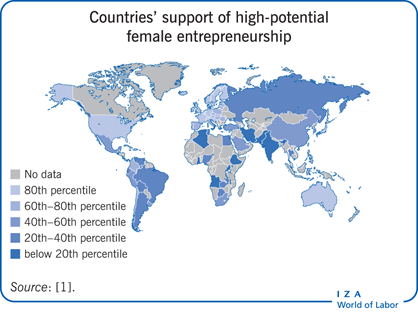Elevator pitch
Female-led ventures that are market-expanding, export-oriented, and innovative contribute substantially to local and national economic development, as well as to the female entrepreneur’s economic welfare. Female-led ventures also serve as models that can encourage other high-potential female entrepreneurs. The supply of high-potential entrepreneurial ventures is driven by individuals’ entrepreneurial attitudes and institutional factors associated with a country’s conditions for entrepreneurial expansion. A systematic assessment of those factors can show policymakers the strengths and weaknesses of the environment for high-potential female entrepreneurship.
Key findings
Pros
Favorable conditions for high potential female entrepreneurship can be measured by the annual Female Entrepreneurship Index.
High-potential female-led ventures can contribute greatly to individual welfare and to regional/national economic development, while also serving as role models for potential entrepreneurs.
Factors that foster high-potential female entrepreneurship include qualities of the individual and of the institutional environment.
Factors interact to form a national entrepreneurship ecosystem with a unique set of strengths and weaknesses, and a country’s ranking changes based on ongoing developments.
Cons
A national index is not a perfect substitute for fully understanding each country’s context, and it does not account for potentially vast regional differences within countries.
Despite growing awareness of the importance of high-potential female entrepreneurship, a majority of countries do not have good environments to support high-potential female entrepreneurs.
There are many additional factors that should be considered but for which there are no consistent data.
There are major data gaps for individual countries, particularly in Africa.
